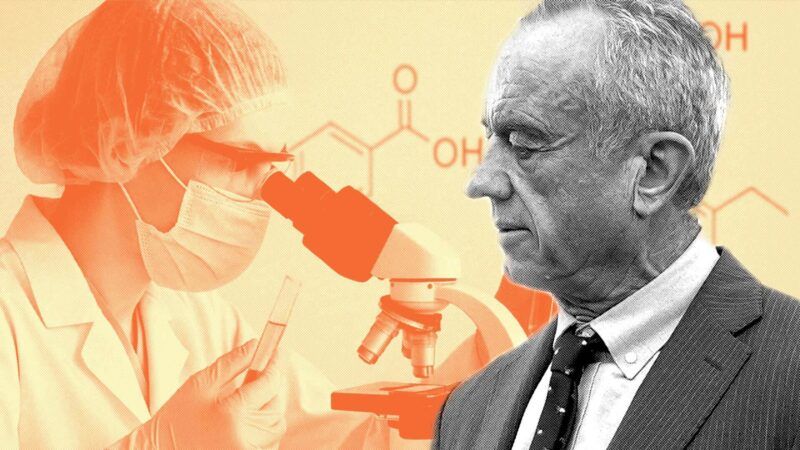RFK Jr. Denigrates Privately Funded Medical Research
The Trump administration has cut billions in federal funding for medical research, as Kennedy singles out private funders for criticism.

President Donald Trump's second administration has targeted government spending in various forms. One example is federal funding for medical research: Trump has cut at least $1.8 billion in funding for grants from the National Institutes of Health (NIH), according to an analysis published in The Journal of the American Medical Association (JAMA), and his annual budget proposal would cut NIH funding even further.
On its own, this scenario is not as alarming as some may say. Private companies spend more on medical research per year than the federal government. But this week, Health and Human Services (HHS) Secretary Robert F. Kennedy Jr. took a shot at private funders as well—raising the question: Who does the administration think should fund medical research?
"NIH has $46 billion that it allocates to science every year," Kennedy said on an episode of the podcast The Ultimate Human. "Unfortunately, that system has been corrupted through a number of different vectors, so the people who get the money tend to be people who have been approved by the industry."
Kennedy called the current system "an old boys' network," where private actors fund studies primarily dedicated to preserving pharmaceutical companies' profits. "The private funding is coming from industries," he added, who "write the outcome before they write the study, in many cases."
While Kennedy briefly allowed that "that also happens in the public sphere," he placed the majority of the blame squarely on the private sector, and he targeted medical journals for punishment.
"We're probably going to stop publishing in The Lancet, The New England Journal of Medicine, JAMA, and those other journals because they're all corrupt," he charged. "Unless these journals change dramatically, we are going to stop NIH scientists from publishing there, and we're going to create our own journals in-house."
Ironically, The Lancet's biggest and most infamous scandal involved a 1998 study determining a link between the MMR vaccine—routinely given to inoculate children against measles, mumps, and rubella—and autism spectrum disorders. The Lancet later retracted the study and its author was stripped of his license to practice medicine.
"The claim that vaccines cause autism has been comprehensively debunked," wrote Ronald Bailey for Reason. Nevertheless, Kennedy apparently still believes it, saying as recently as July 2023, "I do believe that autism comes from vaccines."
In April, Kennedy appointed David Geier, a vaccine "skeptic," to head a government study on the potential links between vaccines and autism. Steven Black, head of the Kaiser Permanente Vaccine Study Center, told The New York Times in 2005 that Geier and his father, a physician who has since been stripped of his medical license, practiced "voodoo science," adding, "The problem with the Geiers' research is that they start with the answers and work backwards"—exactly what Kennedy now accuses pharmaceutical companies of doing.
Of course, medical journals are not perfect. "Medical journals often contain poor science," according to a 2006 article from The Journal of the Royal Society of Medicine. "The journals have, for example, published many reports of treatments applied to single cases and to series of cases, which rarely allow confident conclusions because of the absence of controls."
But it's foolish for Kennedy to suggest the corrupting element is business, and that doing everything from within the federal government would fix the incentive structure.
"If government funds research, it must decide which projects to fund, allowing political forces to influence the choice," Jeffrey Miron and Jacob P. Winter wrote at the Cato Institute in 2023. "President George W. Bush limited federal funding for stem cell research that used human embryos in response to pressure from anti-abortion forces. The recent affirmative action case against Harvard is a legal issue because Harvard accepts federal research funding. The National Institute on Drug Abuse has been criticized for displaying bias in favor of drug prohibition."
Miron and Winter argued that privately funded research not only saves the taxpayers money but actually goes further than government grants: "Between 2010 and 2019, 200 organizations received 80 percent of National Institutes of Health (NIH) and National Science Foundation (NSF) grants, whereas the top 200 recipients of private funding received only 33 percent of donations. Scientists have explained how private funding has enabled them to explore new ideas, adjust budgets, and avoid lengthy bureaucratic approval processes."
NSF found in 2022 that over the previous two decades, federal money fell from 60 percent to 40 percent as a share of total research spending, meanwhile "the share funded by business has increased." In 2022, while 40 percent of research was funded by government, 37 percent was funded by business.
In 2018, two of every three dollars spent on medical research and development came from private businesses, three times what was spent by federal agencies.
The Trump administration has made NIH grants a target for potential cuts. Despite breathless reporting of the potential consequences, private sources account for a similar portion of total research and development dollars, and a much larger portion of medical funding in particular.
But for Kennedy to attack privately funded research while the administration he works for cuts publicly funded research, it's worth asking where they expect the money to come from.
